Healthcare Ethics: Ethical Dilemmas in Nursing Practice Case Study
VerifiedAdded on 2021/06/16
|8
|1898
|26
Case Study
AI Summary
This case study examines the ethical issues arising from the denial of care to a student named Amos, who was suffering from cholera, by a hospital. The analysis highlights violations of ethical principles, including beneficence, non-maleficence, and justice, as the triage nurse and doctor prioritized students residing in boarding facilities over Amos. The paper references codes of ethics and professional conduct for nurses in Australia, emphasizing the importance of unbiased care and adherence to standards of practice. It discusses the four fundamental principles of healthcare ethics: autonomy, justice, beneficence, and non-maleficence, demonstrating how the actions of the healthcare professionals breached these principles. The study provides recommendations for improved professional practice, such as prioritizing patient needs based on the severity of symptoms and ensuring equitable access to care. The case underscores the significance of ethical decision-making in healthcare and the consequences of failing to uphold ethical standards, advocating for a more just and compassionate approach to patient care.
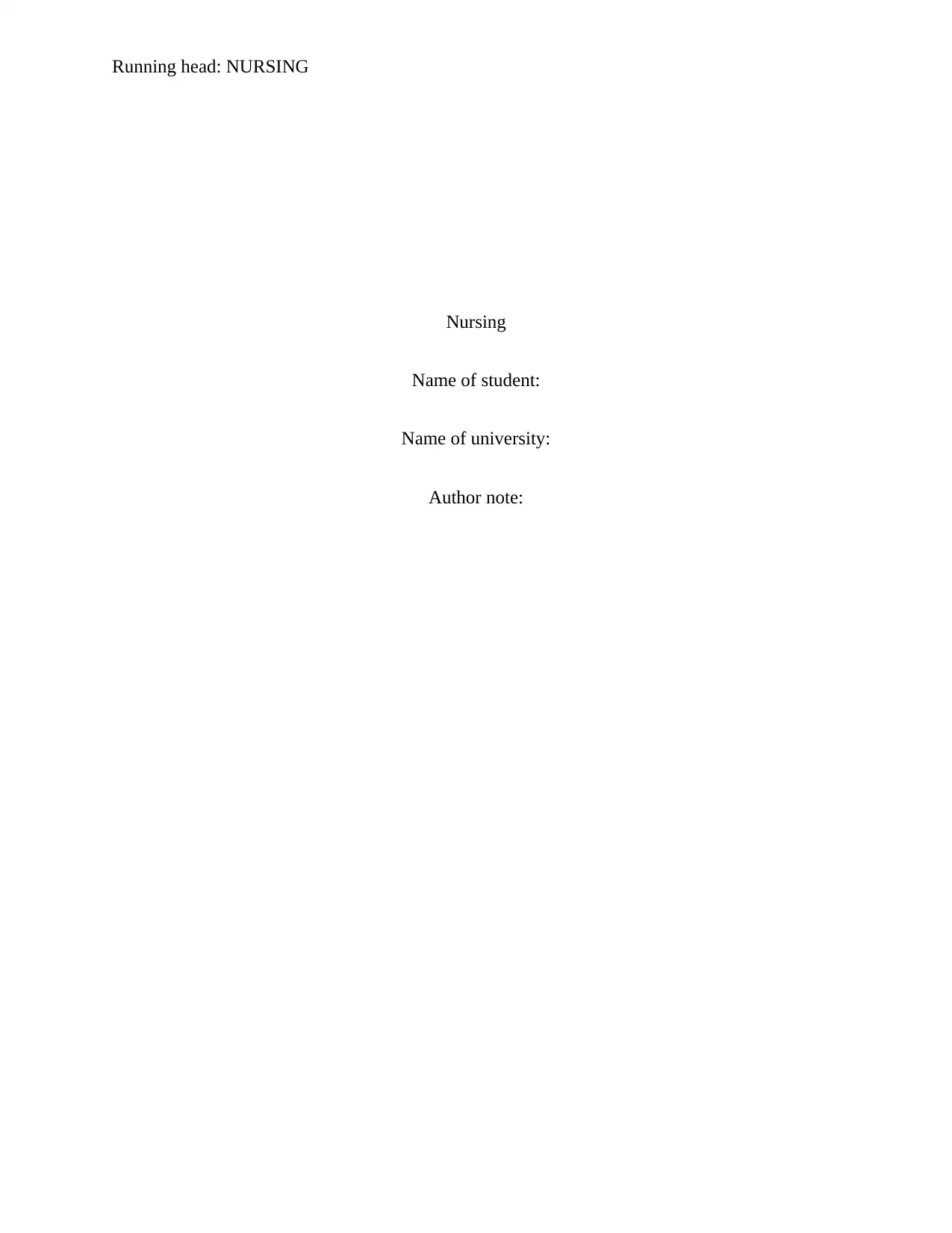
Running head: NURSING
Nursing
Name of student:
Name of university:
Author note:
Nursing
Name of student:
Name of university:
Author note:
Paraphrase This Document
Need a fresh take? Get an instant paraphrase of this document with our AI Paraphraser
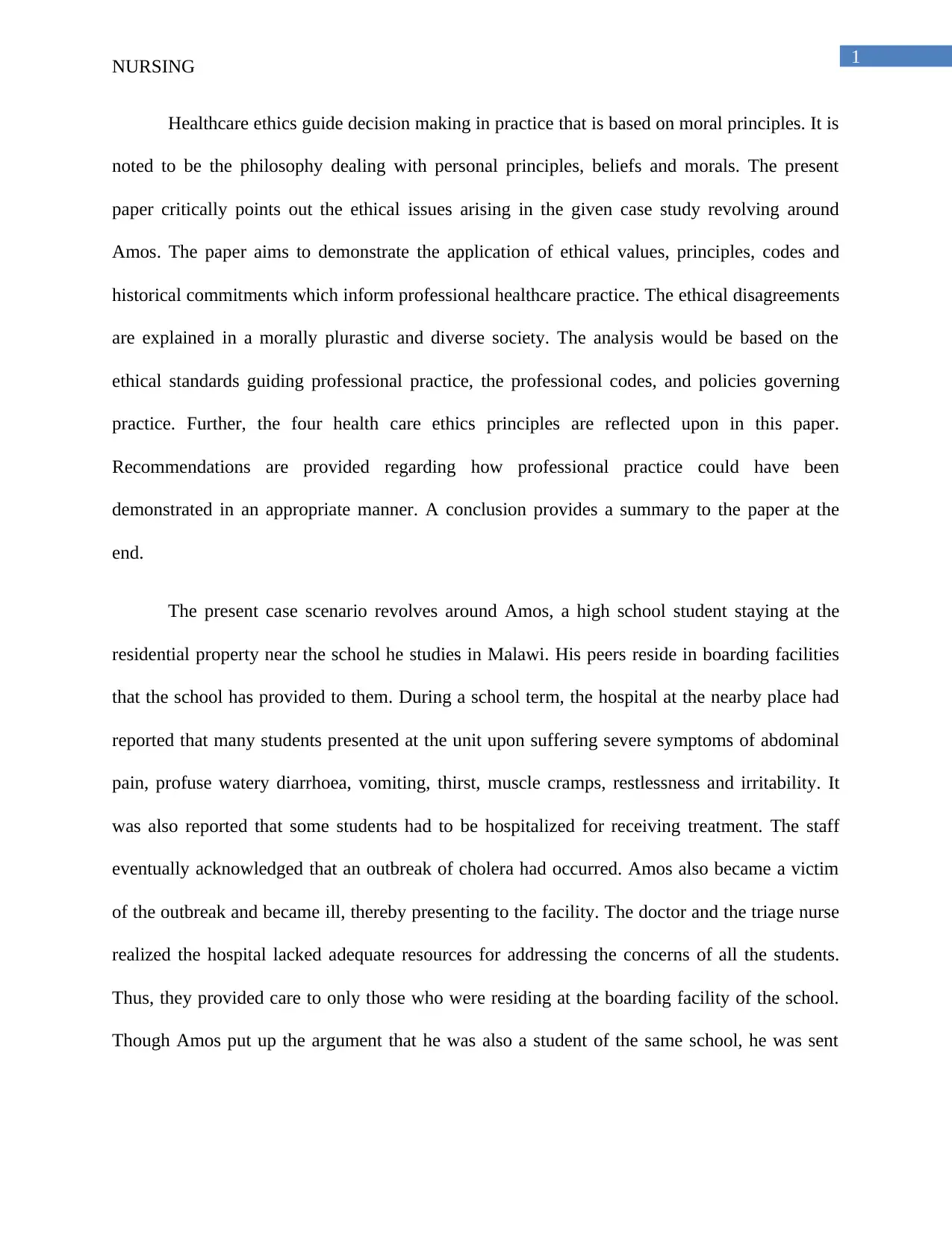
1
NURSING
Healthcare ethics guide decision making in practice that is based on moral principles. It is
noted to be the philosophy dealing with personal principles, beliefs and morals. The present
paper critically points out the ethical issues arising in the given case study revolving around
Amos. The paper aims to demonstrate the application of ethical values, principles, codes and
historical commitments which inform professional healthcare practice. The ethical disagreements
are explained in a morally plurastic and diverse society. The analysis would be based on the
ethical standards guiding professional practice, the professional codes, and policies governing
practice. Further, the four health care ethics principles are reflected upon in this paper.
Recommendations are provided regarding how professional practice could have been
demonstrated in an appropriate manner. A conclusion provides a summary to the paper at the
end.
The present case scenario revolves around Amos, a high school student staying at the
residential property near the school he studies in Malawi. His peers reside in boarding facilities
that the school has provided to them. During a school term, the hospital at the nearby place had
reported that many students presented at the unit upon suffering severe symptoms of abdominal
pain, profuse watery diarrhoea, vomiting, thirst, muscle cramps, restlessness and irritability. It
was also reported that some students had to be hospitalized for receiving treatment. The staff
eventually acknowledged that an outbreak of cholera had occurred. Amos also became a victim
of the outbreak and became ill, thereby presenting to the facility. The doctor and the triage nurse
realized the hospital lacked adequate resources for addressing the concerns of all the students.
Thus, they provided care to only those who were residing at the boarding facility of the school.
Though Amos put up the argument that he was also a student of the same school, he was sent
NURSING
Healthcare ethics guide decision making in practice that is based on moral principles. It is
noted to be the philosophy dealing with personal principles, beliefs and morals. The present
paper critically points out the ethical issues arising in the given case study revolving around
Amos. The paper aims to demonstrate the application of ethical values, principles, codes and
historical commitments which inform professional healthcare practice. The ethical disagreements
are explained in a morally plurastic and diverse society. The analysis would be based on the
ethical standards guiding professional practice, the professional codes, and policies governing
practice. Further, the four health care ethics principles are reflected upon in this paper.
Recommendations are provided regarding how professional practice could have been
demonstrated in an appropriate manner. A conclusion provides a summary to the paper at the
end.
The present case scenario revolves around Amos, a high school student staying at the
residential property near the school he studies in Malawi. His peers reside in boarding facilities
that the school has provided to them. During a school term, the hospital at the nearby place had
reported that many students presented at the unit upon suffering severe symptoms of abdominal
pain, profuse watery diarrhoea, vomiting, thirst, muscle cramps, restlessness and irritability. It
was also reported that some students had to be hospitalized for receiving treatment. The staff
eventually acknowledged that an outbreak of cholera had occurred. Amos also became a victim
of the outbreak and became ill, thereby presenting to the facility. The doctor and the triage nurse
realized the hospital lacked adequate resources for addressing the concerns of all the students.
Thus, they provided care to only those who were residing at the boarding facility of the school.
Though Amos put up the argument that he was also a student of the same school, he was sent
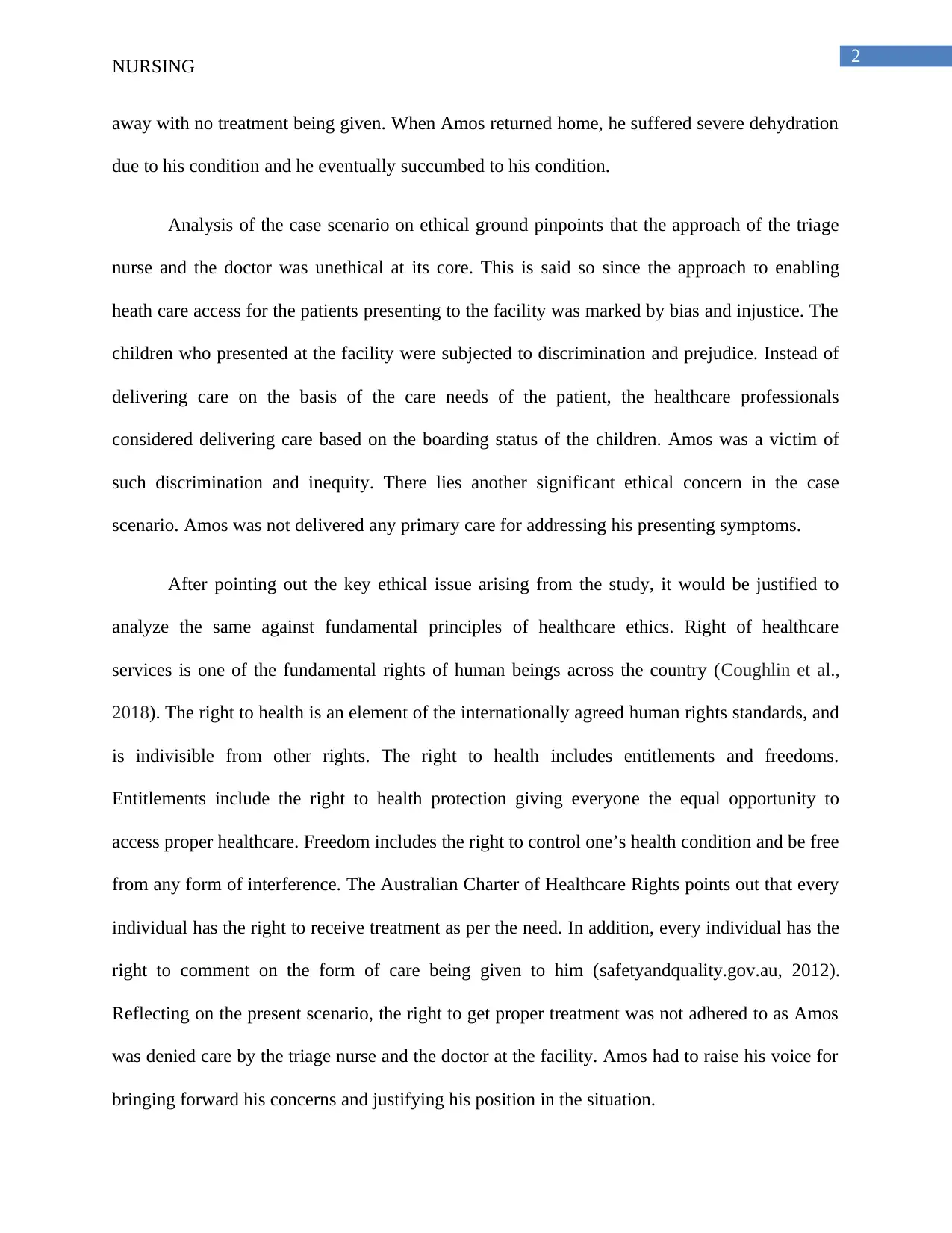
2
NURSING
away with no treatment being given. When Amos returned home, he suffered severe dehydration
due to his condition and he eventually succumbed to his condition.
Analysis of the case scenario on ethical ground pinpoints that the approach of the triage
nurse and the doctor was unethical at its core. This is said so since the approach to enabling
heath care access for the patients presenting to the facility was marked by bias and injustice. The
children who presented at the facility were subjected to discrimination and prejudice. Instead of
delivering care on the basis of the care needs of the patient, the healthcare professionals
considered delivering care based on the boarding status of the children. Amos was a victim of
such discrimination and inequity. There lies another significant ethical concern in the case
scenario. Amos was not delivered any primary care for addressing his presenting symptoms.
After pointing out the key ethical issue arising from the study, it would be justified to
analyze the same against fundamental principles of healthcare ethics. Right of healthcare
services is one of the fundamental rights of human beings across the country (Coughlin et al.,
2018). The right to health is an element of the internationally agreed human rights standards, and
is indivisible from other rights. The right to health includes entitlements and freedoms.
Entitlements include the right to health protection giving everyone the equal opportunity to
access proper healthcare. Freedom includes the right to control one’s health condition and be free
from any form of interference. The Australian Charter of Healthcare Rights points out that every
individual has the right to receive treatment as per the need. In addition, every individual has the
right to comment on the form of care being given to him (safetyandquality.gov.au, 2012).
Reflecting on the present scenario, the right to get proper treatment was not adhered to as Amos
was denied care by the triage nurse and the doctor at the facility. Amos had to raise his voice for
bringing forward his concerns and justifying his position in the situation.
NURSING
away with no treatment being given. When Amos returned home, he suffered severe dehydration
due to his condition and he eventually succumbed to his condition.
Analysis of the case scenario on ethical ground pinpoints that the approach of the triage
nurse and the doctor was unethical at its core. This is said so since the approach to enabling
heath care access for the patients presenting to the facility was marked by bias and injustice. The
children who presented at the facility were subjected to discrimination and prejudice. Instead of
delivering care on the basis of the care needs of the patient, the healthcare professionals
considered delivering care based on the boarding status of the children. Amos was a victim of
such discrimination and inequity. There lies another significant ethical concern in the case
scenario. Amos was not delivered any primary care for addressing his presenting symptoms.
After pointing out the key ethical issue arising from the study, it would be justified to
analyze the same against fundamental principles of healthcare ethics. Right of healthcare
services is one of the fundamental rights of human beings across the country (Coughlin et al.,
2018). The right to health is an element of the internationally agreed human rights standards, and
is indivisible from other rights. The right to health includes entitlements and freedoms.
Entitlements include the right to health protection giving everyone the equal opportunity to
access proper healthcare. Freedom includes the right to control one’s health condition and be free
from any form of interference. The Australian Charter of Healthcare Rights points out that every
individual has the right to receive treatment as per the need. In addition, every individual has the
right to comment on the form of care being given to him (safetyandquality.gov.au, 2012).
Reflecting on the present scenario, the right to get proper treatment was not adhered to as Amos
was denied care by the triage nurse and the doctor at the facility. Amos had to raise his voice for
bringing forward his concerns and justifying his position in the situation.
⊘ This is a preview!⊘
Do you want full access?
Subscribe today to unlock all pages.

Trusted by 1+ million students worldwide
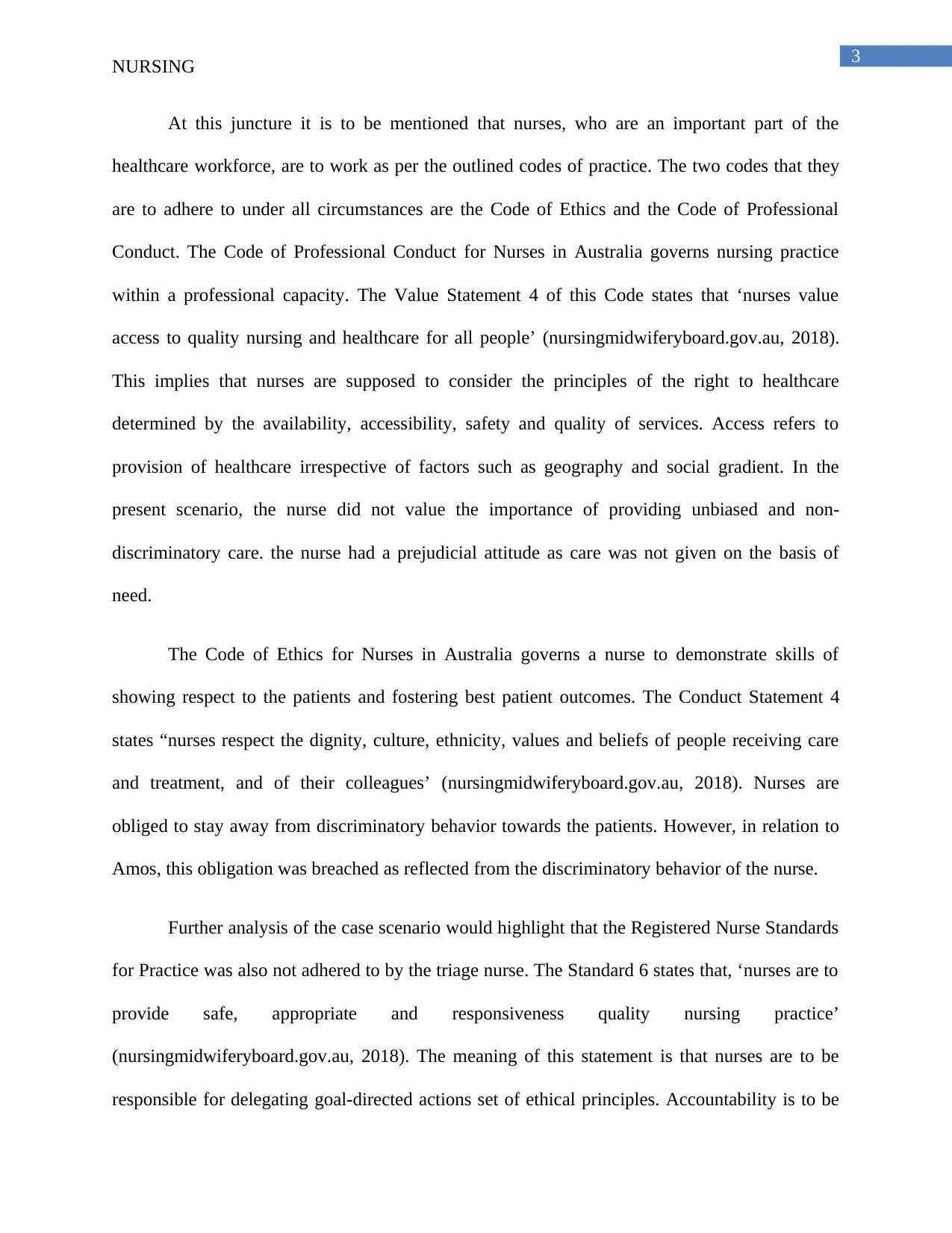
3
NURSING
At this juncture it is to be mentioned that nurses, who are an important part of the
healthcare workforce, are to work as per the outlined codes of practice. The two codes that they
are to adhere to under all circumstances are the Code of Ethics and the Code of Professional
Conduct. The Code of Professional Conduct for Nurses in Australia governs nursing practice
within a professional capacity. The Value Statement 4 of this Code states that ‘nurses value
access to quality nursing and healthcare for all people’ (nursingmidwiferyboard.gov.au, 2018).
This implies that nurses are supposed to consider the principles of the right to healthcare
determined by the availability, accessibility, safety and quality of services. Access refers to
provision of healthcare irrespective of factors such as geography and social gradient. In the
present scenario, the nurse did not value the importance of providing unbiased and non-
discriminatory care. the nurse had a prejudicial attitude as care was not given on the basis of
need.
The Code of Ethics for Nurses in Australia governs a nurse to demonstrate skills of
showing respect to the patients and fostering best patient outcomes. The Conduct Statement 4
states “nurses respect the dignity, culture, ethnicity, values and beliefs of people receiving care
and treatment, and of their colleagues’ (nursingmidwiferyboard.gov.au, 2018). Nurses are
obliged to stay away from discriminatory behavior towards the patients. However, in relation to
Amos, this obligation was breached as reflected from the discriminatory behavior of the nurse.
Further analysis of the case scenario would highlight that the Registered Nurse Standards
for Practice was also not adhered to by the triage nurse. The Standard 6 states that, ‘nurses are to
provide safe, appropriate and responsiveness quality nursing practice’
(nursingmidwiferyboard.gov.au, 2018). The meaning of this statement is that nurses are to be
responsible for delegating goal-directed actions set of ethical principles. Accountability is to be
NURSING
At this juncture it is to be mentioned that nurses, who are an important part of the
healthcare workforce, are to work as per the outlined codes of practice. The two codes that they
are to adhere to under all circumstances are the Code of Ethics and the Code of Professional
Conduct. The Code of Professional Conduct for Nurses in Australia governs nursing practice
within a professional capacity. The Value Statement 4 of this Code states that ‘nurses value
access to quality nursing and healthcare for all people’ (nursingmidwiferyboard.gov.au, 2018).
This implies that nurses are supposed to consider the principles of the right to healthcare
determined by the availability, accessibility, safety and quality of services. Access refers to
provision of healthcare irrespective of factors such as geography and social gradient. In the
present scenario, the nurse did not value the importance of providing unbiased and non-
discriminatory care. the nurse had a prejudicial attitude as care was not given on the basis of
need.
The Code of Ethics for Nurses in Australia governs a nurse to demonstrate skills of
showing respect to the patients and fostering best patient outcomes. The Conduct Statement 4
states “nurses respect the dignity, culture, ethnicity, values and beliefs of people receiving care
and treatment, and of their colleagues’ (nursingmidwiferyboard.gov.au, 2018). Nurses are
obliged to stay away from discriminatory behavior towards the patients. However, in relation to
Amos, this obligation was breached as reflected from the discriminatory behavior of the nurse.
Further analysis of the case scenario would highlight that the Registered Nurse Standards
for Practice was also not adhered to by the triage nurse. The Standard 6 states that, ‘nurses are to
provide safe, appropriate and responsiveness quality nursing practice’
(nursingmidwiferyboard.gov.au, 2018). The meaning of this statement is that nurses are to be
responsible for delegating goal-directed actions set of ethical principles. Accountability is to be
Paraphrase This Document
Need a fresh take? Get an instant paraphrase of this document with our AI Paraphraser
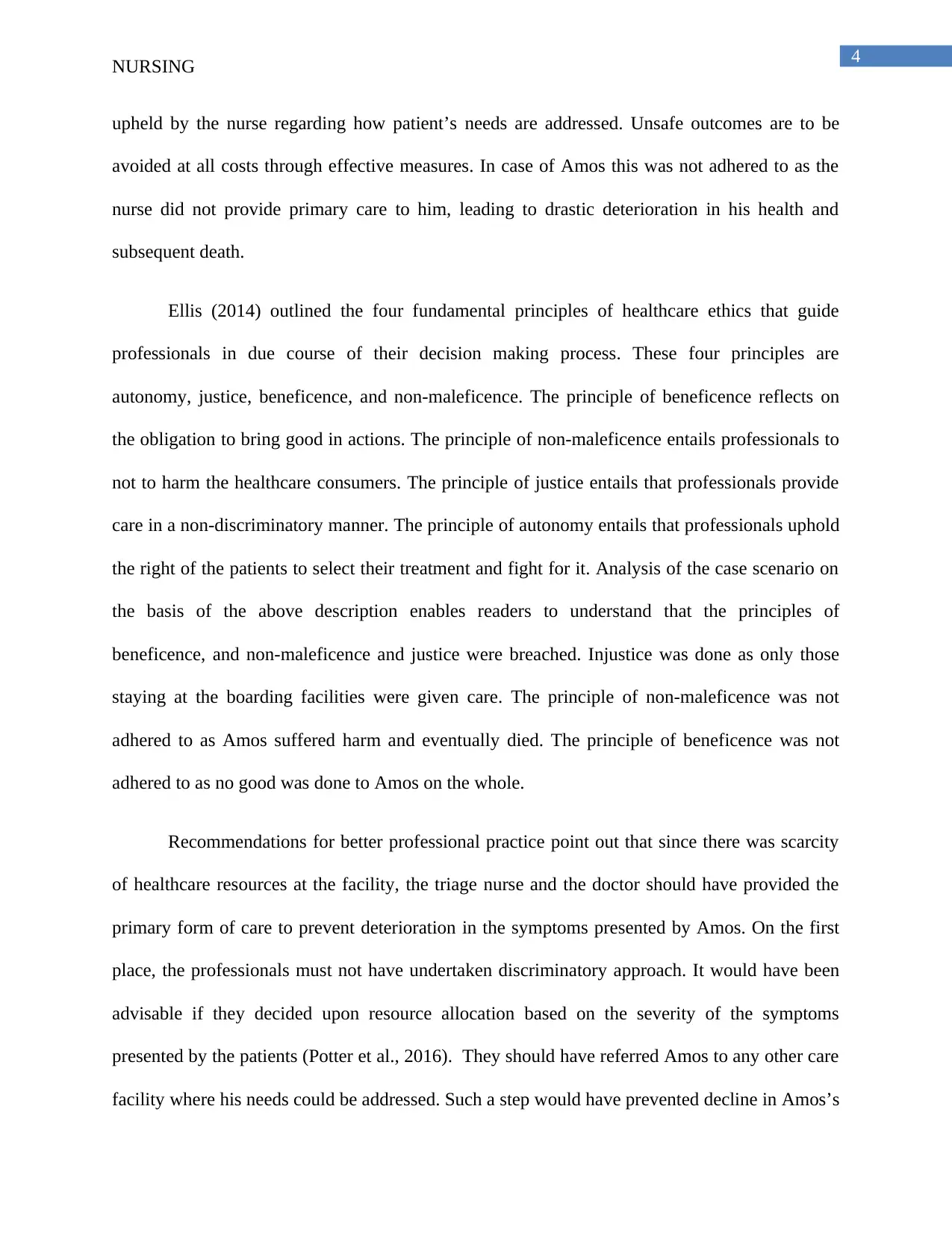
4
NURSING
upheld by the nurse regarding how patient’s needs are addressed. Unsafe outcomes are to be
avoided at all costs through effective measures. In case of Amos this was not adhered to as the
nurse did not provide primary care to him, leading to drastic deterioration in his health and
subsequent death.
Ellis (2014) outlined the four fundamental principles of healthcare ethics that guide
professionals in due course of their decision making process. These four principles are
autonomy, justice, beneficence, and non-maleficence. The principle of beneficence reflects on
the obligation to bring good in actions. The principle of non-maleficence entails professionals to
not to harm the healthcare consumers. The principle of justice entails that professionals provide
care in a non-discriminatory manner. The principle of autonomy entails that professionals uphold
the right of the patients to select their treatment and fight for it. Analysis of the case scenario on
the basis of the above description enables readers to understand that the principles of
beneficence, and non-maleficence and justice were breached. Injustice was done as only those
staying at the boarding facilities were given care. The principle of non-maleficence was not
adhered to as Amos suffered harm and eventually died. The principle of beneficence was not
adhered to as no good was done to Amos on the whole.
Recommendations for better professional practice point out that since there was scarcity
of healthcare resources at the facility, the triage nurse and the doctor should have provided the
primary form of care to prevent deterioration in the symptoms presented by Amos. On the first
place, the professionals must not have undertaken discriminatory approach. It would have been
advisable if they decided upon resource allocation based on the severity of the symptoms
presented by the patients (Potter et al., 2016). They should have referred Amos to any other care
facility where his needs could be addressed. Such a step would have prevented decline in Amos’s
NURSING
upheld by the nurse regarding how patient’s needs are addressed. Unsafe outcomes are to be
avoided at all costs through effective measures. In case of Amos this was not adhered to as the
nurse did not provide primary care to him, leading to drastic deterioration in his health and
subsequent death.
Ellis (2014) outlined the four fundamental principles of healthcare ethics that guide
professionals in due course of their decision making process. These four principles are
autonomy, justice, beneficence, and non-maleficence. The principle of beneficence reflects on
the obligation to bring good in actions. The principle of non-maleficence entails professionals to
not to harm the healthcare consumers. The principle of justice entails that professionals provide
care in a non-discriminatory manner. The principle of autonomy entails that professionals uphold
the right of the patients to select their treatment and fight for it. Analysis of the case scenario on
the basis of the above description enables readers to understand that the principles of
beneficence, and non-maleficence and justice were breached. Injustice was done as only those
staying at the boarding facilities were given care. The principle of non-maleficence was not
adhered to as Amos suffered harm and eventually died. The principle of beneficence was not
adhered to as no good was done to Amos on the whole.
Recommendations for better professional practice point out that since there was scarcity
of healthcare resources at the facility, the triage nurse and the doctor should have provided the
primary form of care to prevent deterioration in the symptoms presented by Amos. On the first
place, the professionals must not have undertaken discriminatory approach. It would have been
advisable if they decided upon resource allocation based on the severity of the symptoms
presented by the patients (Potter et al., 2016). They should have referred Amos to any other care
facility where his needs could be addressed. Such a step would have prevented decline in Amos’s
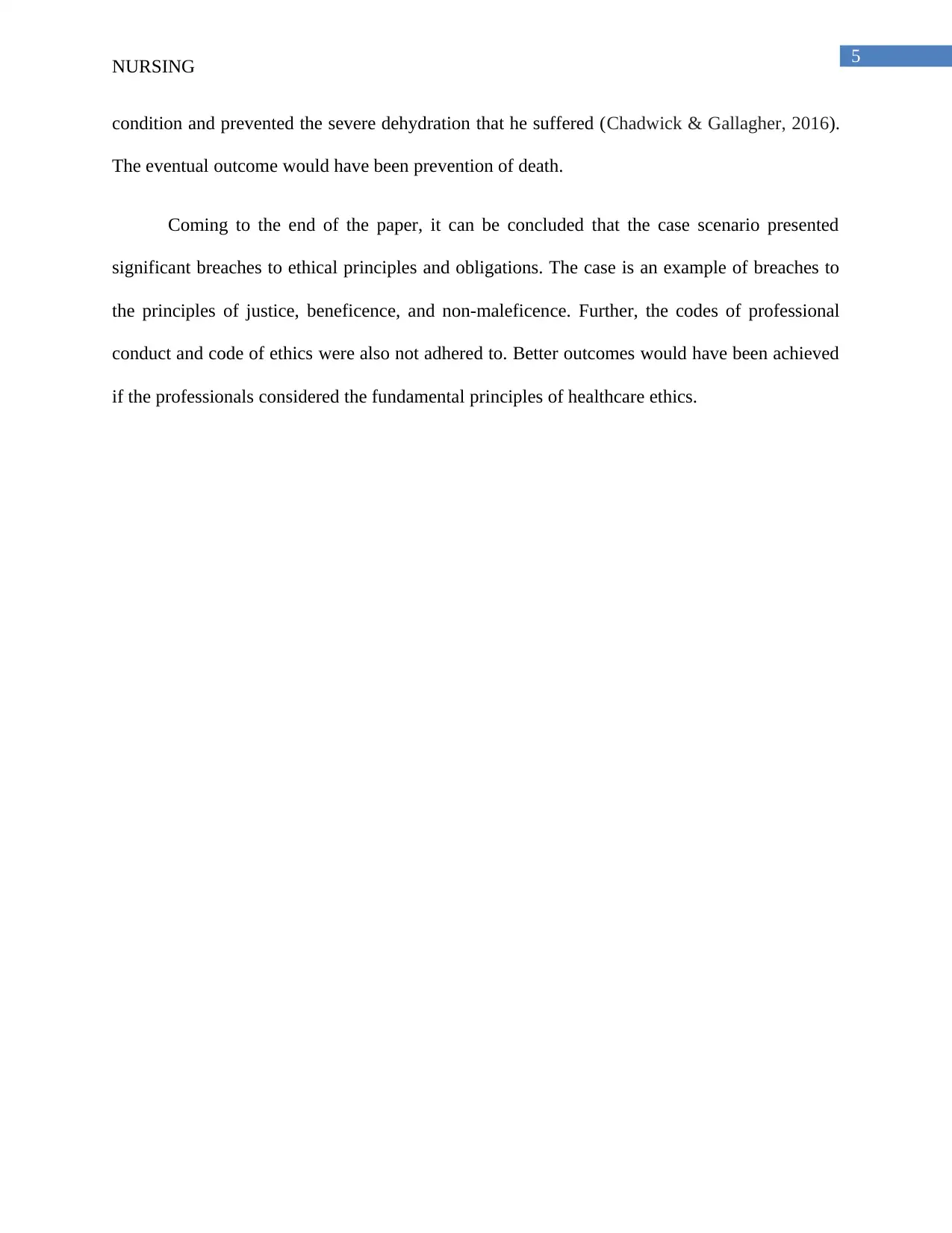
5
NURSING
condition and prevented the severe dehydration that he suffered (Chadwick & Gallagher, 2016).
The eventual outcome would have been prevention of death.
Coming to the end of the paper, it can be concluded that the case scenario presented
significant breaches to ethical principles and obligations. The case is an example of breaches to
the principles of justice, beneficence, and non-maleficence. Further, the codes of professional
conduct and code of ethics were also not adhered to. Better outcomes would have been achieved
if the professionals considered the fundamental principles of healthcare ethics.
NURSING
condition and prevented the severe dehydration that he suffered (Chadwick & Gallagher, 2016).
The eventual outcome would have been prevention of death.
Coming to the end of the paper, it can be concluded that the case scenario presented
significant breaches to ethical principles and obligations. The case is an example of breaches to
the principles of justice, beneficence, and non-maleficence. Further, the codes of professional
conduct and code of ethics were also not adhered to. Better outcomes would have been achieved
if the professionals considered the fundamental principles of healthcare ethics.
⊘ This is a preview!⊘
Do you want full access?
Subscribe today to unlock all pages.

Trusted by 1+ million students worldwide
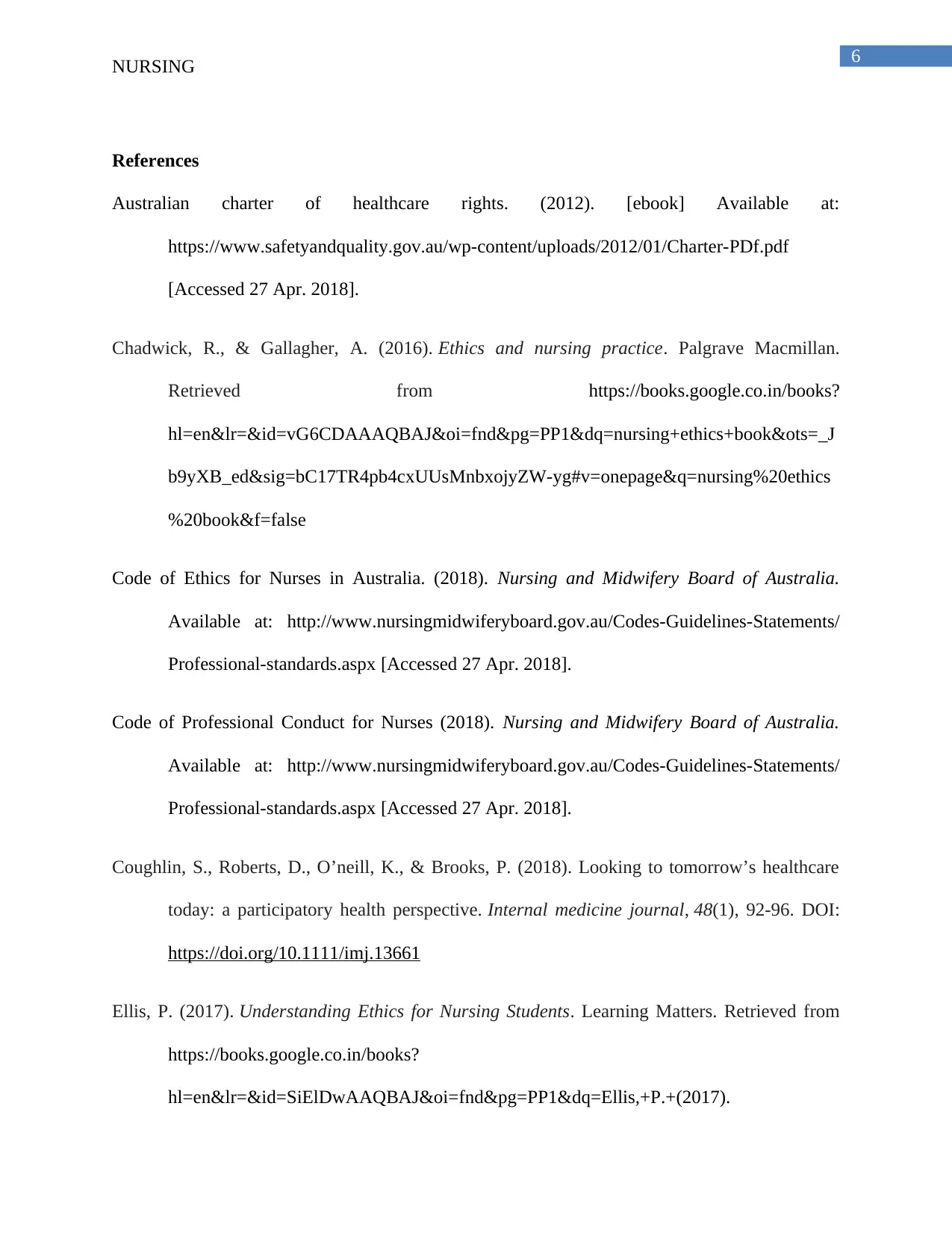
6
NURSING
References
Australian charter of healthcare rights. (2012). [ebook] Available at:
https://www.safetyandquality.gov.au/wp-content/uploads/2012/01/Charter-PDf.pdf
[Accessed 27 Apr. 2018].
Chadwick, R., & Gallagher, A. (2016). Ethics and nursing practice. Palgrave Macmillan.
Retrieved from https://books.google.co.in/books?
hl=en&lr=&id=vG6CDAAAQBAJ&oi=fnd&pg=PP1&dq=nursing+ethics+book&ots=_J
b9yXB_ed&sig=bC17TR4pb4cxUUsMnbxojyZW-yg#v=onepage&q=nursing%20ethics
%20book&f=false
Code of Ethics for Nurses in Australia. (2018). Nursing and Midwifery Board of Australia.
Available at: http://www.nursingmidwiferyboard.gov.au/Codes-Guidelines-Statements/
Professional-standards.aspx [Accessed 27 Apr. 2018].
Code of Professional Conduct for Nurses (2018). Nursing and Midwifery Board of Australia.
Available at: http://www.nursingmidwiferyboard.gov.au/Codes-Guidelines-Statements/
Professional-standards.aspx [Accessed 27 Apr. 2018].
Coughlin, S., Roberts, D., O’neill, K., & Brooks, P. (2018). Looking to tomorrow’s healthcare
today: a participatory health perspective. Internal medicine journal, 48(1), 92-96. DOI:
https://doi.org/10.1111/imj.13661
Ellis, P. (2017). Understanding Ethics for Nursing Students. Learning Matters. Retrieved from
https://books.google.co.in/books?
hl=en&lr=&id=SiElDwAAQBAJ&oi=fnd&pg=PP1&dq=Ellis,+P.+(2017).
NURSING
References
Australian charter of healthcare rights. (2012). [ebook] Available at:
https://www.safetyandquality.gov.au/wp-content/uploads/2012/01/Charter-PDf.pdf
[Accessed 27 Apr. 2018].
Chadwick, R., & Gallagher, A. (2016). Ethics and nursing practice. Palgrave Macmillan.
Retrieved from https://books.google.co.in/books?
hl=en&lr=&id=vG6CDAAAQBAJ&oi=fnd&pg=PP1&dq=nursing+ethics+book&ots=_J
b9yXB_ed&sig=bC17TR4pb4cxUUsMnbxojyZW-yg#v=onepage&q=nursing%20ethics
%20book&f=false
Code of Ethics for Nurses in Australia. (2018). Nursing and Midwifery Board of Australia.
Available at: http://www.nursingmidwiferyboard.gov.au/Codes-Guidelines-Statements/
Professional-standards.aspx [Accessed 27 Apr. 2018].
Code of Professional Conduct for Nurses (2018). Nursing and Midwifery Board of Australia.
Available at: http://www.nursingmidwiferyboard.gov.au/Codes-Guidelines-Statements/
Professional-standards.aspx [Accessed 27 Apr. 2018].
Coughlin, S., Roberts, D., O’neill, K., & Brooks, P. (2018). Looking to tomorrow’s healthcare
today: a participatory health perspective. Internal medicine journal, 48(1), 92-96. DOI:
https://doi.org/10.1111/imj.13661
Ellis, P. (2017). Understanding Ethics for Nursing Students. Learning Matters. Retrieved from
https://books.google.co.in/books?
hl=en&lr=&id=SiElDwAAQBAJ&oi=fnd&pg=PP1&dq=Ellis,+P.+(2017).
Paraphrase This Document
Need a fresh take? Get an instant paraphrase of this document with our AI Paraphraser
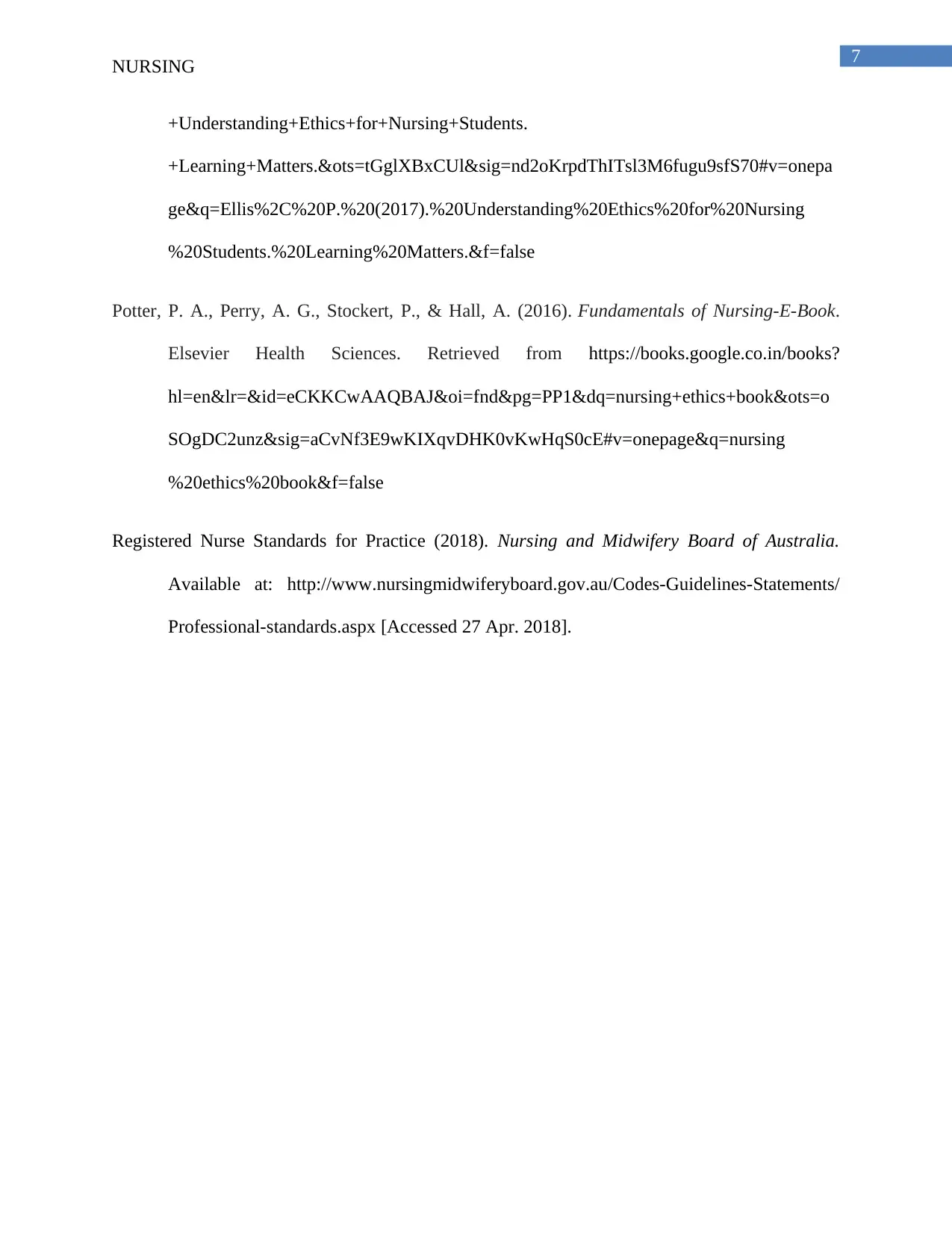
7
NURSING
+Understanding+Ethics+for+Nursing+Students.
+Learning+Matters.&ots=tGglXBxCUl&sig=nd2oKrpdThITsl3M6fugu9sfS70#v=onepa
ge&q=Ellis%2C%20P.%20(2017).%20Understanding%20Ethics%20for%20Nursing
%20Students.%20Learning%20Matters.&f=false
Potter, P. A., Perry, A. G., Stockert, P., & Hall, A. (2016). Fundamentals of Nursing-E-Book.
Elsevier Health Sciences. Retrieved from https://books.google.co.in/books?
hl=en&lr=&id=eCKKCwAAQBAJ&oi=fnd&pg=PP1&dq=nursing+ethics+book&ots=o
SOgDC2unz&sig=aCvNf3E9wKIXqvDHK0vKwHqS0cE#v=onepage&q=nursing
%20ethics%20book&f=false
Registered Nurse Standards for Practice (2018). Nursing and Midwifery Board of Australia.
Available at: http://www.nursingmidwiferyboard.gov.au/Codes-Guidelines-Statements/
Professional-standards.aspx [Accessed 27 Apr. 2018].
NURSING
+Understanding+Ethics+for+Nursing+Students.
+Learning+Matters.&ots=tGglXBxCUl&sig=nd2oKrpdThITsl3M6fugu9sfS70#v=onepa
ge&q=Ellis%2C%20P.%20(2017).%20Understanding%20Ethics%20for%20Nursing
%20Students.%20Learning%20Matters.&f=false
Potter, P. A., Perry, A. G., Stockert, P., & Hall, A. (2016). Fundamentals of Nursing-E-Book.
Elsevier Health Sciences. Retrieved from https://books.google.co.in/books?
hl=en&lr=&id=eCKKCwAAQBAJ&oi=fnd&pg=PP1&dq=nursing+ethics+book&ots=o
SOgDC2unz&sig=aCvNf3E9wKIXqvDHK0vKwHqS0cE#v=onepage&q=nursing
%20ethics%20book&f=false
Registered Nurse Standards for Practice (2018). Nursing and Midwifery Board of Australia.
Available at: http://www.nursingmidwiferyboard.gov.au/Codes-Guidelines-Statements/
Professional-standards.aspx [Accessed 27 Apr. 2018].
1 out of 8
Related Documents
Your All-in-One AI-Powered Toolkit for Academic Success.
+13062052269
info@desklib.com
Available 24*7 on WhatsApp / Email
![[object Object]](/_next/static/media/star-bottom.7253800d.svg)
Unlock your academic potential
Copyright © 2020–2026 A2Z Services. All Rights Reserved. Developed and managed by ZUCOL.





